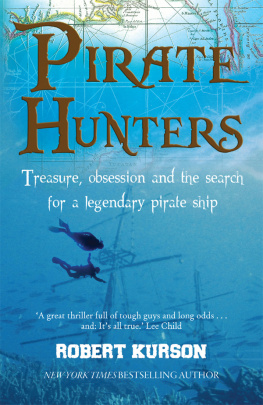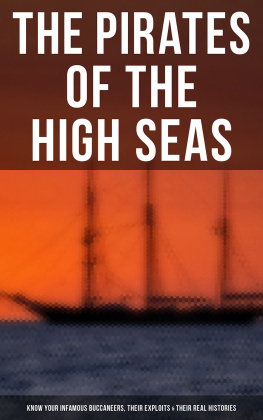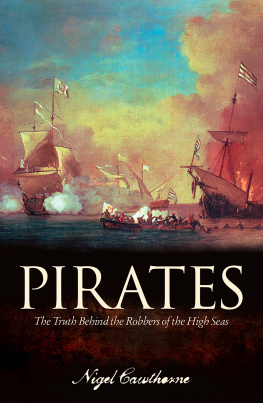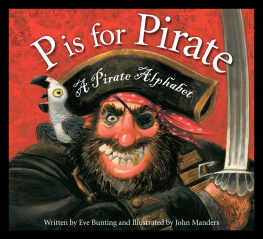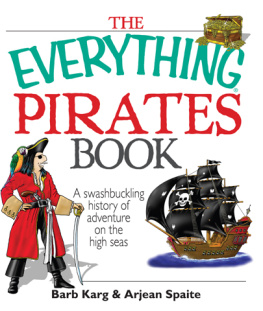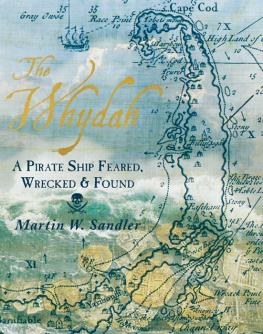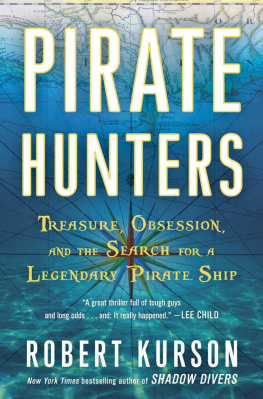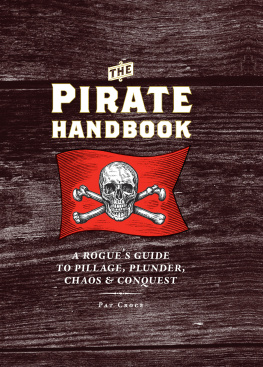Praise for Pirate Hunters
Pirate Hunters is a fantastic book, an utterly engrossing and satisfying read. It tells the story of the hunt for the rare wreck of a pirate ship, which had been captained by one of the most remarkable pirates in history. This is a real-life Treasure Island, complete with swashbuckling, half-crazy treasure hunters and vivid Caribbean settingsa story for the ages.
Douglas Preston
A terrific read. I was pulled in from page one. Kurson brings us face to face with some of the most swashbuckling pirates ever to sail the Caribbean, even as he takes us underwater on a high-tech quest to discover the relics they left behind.
Daniel James Brown
Theres nothing in the world like buried treasureand people hungry and obsessed enough to risk their lives for it. Pirate Hunters isnt just a good storyits a true one. Searching for the souls of its explorers, it takes you to the far tip of the plank and plunges you deep to the bottom of the ocean.
Brad Meltzer
A great thriller full of tough guys and long odds... and: Its all true.
Lee Child
Kursons own enthusiasm, combined with his copious research and an eye for detail, makes for one of the most mind-blowing pirate stories of recent memory, one that even the staunchest landlubber will have a hard time putting down.
Publishers Weekly
Action and adventure on land and seayou cant ask for more. But Robert Kurson raises the ante in Pirate Hunters with an array of mystery and a fleet of colorful characters spanning four centuries. This is a great summer read!
Michael Connelly
Kursons own style of writing and the story he tells is reason enough to read this narrative from cover to cover....Anyone with a sense of adventure will enjoy this book. Highly recommended to readers who delight in adventure, suspense, and the thrill of discovering history at their fingertips.
Library Journal
BY ROBERT KURSON
Shadow Divers
Crashing Through
Pirate Hunters

For Amy,
my treasure found
Now and then we had a hope that if
we lived and were good,
God would permit us to be pirates.
MARK TWAIN
Pirates could happen to anyone.
TOM STOPPARD
AUTHORS NOTE
E arly one January morning in 2012, I received an international call from an unknown number. It was coming from the Dominican Republic, but I didnt know anyone in that country, I had never been there in my life. The voice on the line, however, was unmistakable.
If you like pirates, meet me in New Jersey.
The caller was John Chatterton, one of the heroes of my book Shadow Divers, a true story about two weekend scuba divers who discover a World War II German U-boat sunk off the coast of New Jersey, and their obsessive and deadly quest to identify the wreck. I hadnt spoken to Chatterton in more than a year, but knew his New Yorktinged baritone right away.
What kind of pirates? I asked.
Seventeenth century. Caribbean. The real deal.
Just the mention of pirates sat me straight up in my seat. But the timing for a trip from Chicago to New Jersey could not have been worse. It was snowing. I was researching a new book. And I was just winding down from the holidays. But Id learned something from Chatterton the first time aroundif theres a window to go, you go. An hour later, I was on I-94 headed east.
Late that night, I pulled into Scottys Steakhouse in Springfield, New Jersey. I hadnt seen Chatterton for three years, but he looked younger than I remembered. He was sixty now, but appeared in better shape than men half his age. He introduced me to his friend John Mattera, a man of about fifty with a broad smile and a Staten Island accent. Id met Mattera years earlier, and remembered hed worked as an executive bodyguard. His arms still looked the part.
We ordered drinks and caught up on family, then Chatterton got down to business.
How much do you know about the Golden Age of Piracy? he asked.
As it turned out, I knew quite a bit. Years earlier, at a used bookstore, Id picked up a tiny paperback called The Buccaneers of America by Alexandre Exquemelin, a true account of pirate life by a man whod sailed aboard real pirate ships and had chronicled the exploits of Captain Henry Morgan. The book, considered a classic, couldnt have been more than two hundred pages. I had paid two dollars and taken it to lunch with me down the street.
I never got to the food.
Exquemelins pirates were wilder than in any movie, more treacherous than in any novel. They conquered entire cities, devised ingenious methods for plundering, and struck terror into the hearts of their enemies, sometimes without raising a sword. By a single act aloneperhaps by eating the still-beating heart of a merchant captain who refused to surrenderthey broadcast their reputations across oceans. Even their downtime was epic, so packed with debauchery and fast living it would have spun the heads of modern millionaire rock stars. And yet, these pirates lived by a code of conduct and honor so far ahead of its time it made them nearly invincible.
They also left no trail. Only one pirate ship had ever been discovered and positively identified in the centuries since the buccaneers prowled the oceans: the Whydah, found in waters off Cape Cod in 1984. Nothing was harder to find underwateror maybe in all the worldthan a pirate ship. It was as if every trace of the buccaneers had disappeared.
I read every pirate book I could find after devouring Exquemelin, asked at rare coin shops to see silver pieces of eight, and even drove cross-country to explore a museum exhibit on the Whydah. So I knew about the Golden Age, which lasted from about 1650 to 1720.
Good, Mattera said. Because we just spent a year living in the seventeenth century.
For the next three hours, the men told me of their quest to find a great pirate shipa journey filled with danger, diving, and mystery. They talked about researching the history of pirates in libraries and archives around the globe. They described using cutting-edge technology and tracking down ancient maps and manuscripts. They told stories about learning from wise elders, and doing battle with cutthroats and rivals. And they told me about their search for a pirate captain more notorious than Blackbeard and more daring than William Kidd, a real-life Jack Sparrow, a man whod been legend but whose story had been lost to time: the buccaneer Joseph Bannister.
I pressed the men for more details and asked questions until the restaurant closed. In the parking lot, they told me theyd be happy to talk further, but that a person couldnt truly understand what theyd been through without seeing for himself where it all had happened.
Two weeks later, I met Chatterton and Mattera in the Colonial Zone in Santo Domingo, the oldest permanent settlement in the New World. We walked down the cobblestoned Calle Las Damas, the first paved road in the Americas. To my right, I could see the home of conquistador Nicols de Ovando, built in 1502, complete with dungeons; to my left, the oldest church in the New World. After breakfast, the men took me to a sixteenth-century coral block structure. This was the laboratory at the Oficina Nacional de Patrimonio Cultural Subacutico, the place where artifacts discovered by treasure hunters were cataloged and divvied up.
I didnt know where to look first. On one table was a nine-foot gold chain from the seventeenth century. On another was a set of slave manacles and an egg-shaped box made of pure silver. In a cement tank, lying in water, was an anchor used by Christopher Columbus. In the States, the anchor would have been protected by Plexiglas and guarded by lasers. Here, I was free to reach in and touch it, and I did. Time disappeared with the contact. This is what Columbuss world felt like. Now I was feeling it, too.

